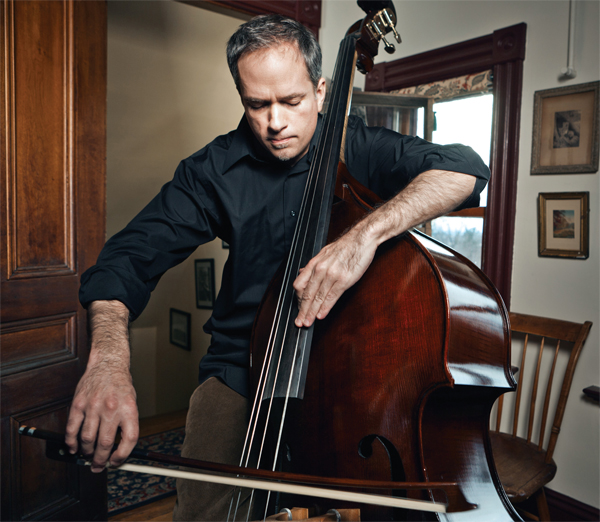HOME
PAST DIGITAL ISSUES
HIV/AIDS HOTLINES
HIV 101
POSITIVE PROFILES
ASO SPOTLIGHT
RECENT ARTICLES
HOW TO PAY FOR HIV TREATMENT AND MEDICATIONS
ADAP CRITERIA AND FORMULARIES
ASO LISTINGS
REVIEW OF HIV MEDICATIONS
2018 HIV/AIDS FUNDRAISING ACTIVITIES & EVENTS
ABOUT HIV POSITIVE! MAGAZINE
LINKS
SUBSCRIBE
CONTACT US
ADVERTISER INFORMATION

Will Tilley was diagnosed with HIV in 1991, at the height of his career as a classical musician.
“I got my diagnosis at the clinic, and had to go straight down the street to play a concert with the Philadelphia Orchestra, which is a very conservative organization,” Will said. “It was a schizophrenic life. I had to go on welfare to qualify for my drugs. I’d go to the worst parts of Philadelphia to get my food stamps, and then go to the Academy of Music to play Beethoven.”
The pressure of managing health issues, financial difficulties and a top rank career forced Will in 1999 to let go of his beloved double bass. “Later on, when my mental health improved, I realized that letting the music go was a way of protecting my passion for it. The strain of the other areas of my life was making me hate the practice you have to do to stay on top.”
“After quitting the career, I went back home to Vermont,” Will said. “I had peripheral neuropathy from the medications, and I concentrated on getting healthy again."
But he couldn’t stay away from his first love forever. After 18 months of grueling physical therapy, Will went to Italy to acquire a new instrument, and resumed playing with renewed passion.
“I can’t describe what it feels like to play an instrument, have it ripped from you, and then find it again. It’s like losing someone you love, and then reuniting. I was surprised how easily I regained my musical chops. I had to audition again, but I got back all my old jobs except for the Philadelphia Orchestra. I’m based in Vermont, but I travel a lot. I’m playing everything and anything I can get my hands on. I’m also teaching for the first time in my life, and I love it. My very first student to audition for the conservatories got into all the schools of his choice.”
Very shortly after Will got his new instrument, he posed for the photo shown with this article – which is in a new book called “Gay in America.”
“I saw an advertisement by a photographer named Scott Pasfield,” Will said. “The ad offered a free set of photos to anyone who posed. I was looking for some publicity shots to help me get back into music again, so I got in touch. Being an artist myself, I could tell that Scott was genuine and authentic as soon as we started to talk.”
Scott Pasfield came to Vermont to shoot Will.
“He took a lot of photographs, some with the bass and some without,” Will says. “Some of them were pretty cool. Interestingly, the photo in the book was not one Scott and I initially considered, but I love it. I wasn’t actually posing for this one. I told Scott, ‘I’m just going to practice like I usually do,’ and that’s when he captured that image.”
As a long-term HIV survivor, Will is keenly aware of how things have changed since he was diagnosed.
“They didn’t even have protease inhibitors in 1991,” Will said. “So it wasn’t a question of ‘if’ I would die, but ‘when.’ To tell my Vermont farm family parents that I was HIV-positive was not the same then as it would be today. They thought I was already dead. I remember going home for my first Christmas after my diagnosis. They had a card table set up for me in the other room with disposable utensils. Things are better now – especially in the medical sense. You don’t have to die from HIV anymore. But the stigma is still there, both for gay people and for people who are HIV-positive.”
We asked Will what advice he would give someone who was newly diagnosed with HIV.
“I would tell them to own it – but not embrace it,” Will said. “Take responsibility for it, but don’t let it affect your daily life. It’s not the end of the world. But take it seriously.”
“Get healthy,” Will said. “Not just for the HIV, but because healthy is better in every way. If you’re drinking too much, find a way to cut back. If you’re taking drugs, find a way to stop.”
“Ask for help if you need it,” Will continued. “Don’t try to be an island. I was really lucky. I had a fantastic doctor and really good people around me. Having that kind of support is important.”
“I had given up when protease inhibitors came along,” Will said. “I was spending too much money – what did it matter? You don’t save for the future when you don’t have one. Later, when the meds had improved, my doctor told me flat out that I would not die from an HIV-related illness. I thought, ‘Well, that’s good news. But now what am I going to do?’”
“Now I know the answer to that question. Music is my vocation. The music world has taken a body slam from this economy. Even the Philadelphia Orchestra is going through bankruptcy. Hard to believe! All of us in the classical music field have to adapt. I’m going to adapt – and keep on playing.”
Copyright 2018, Positive Health Publications, Inc.
This magazine is intended to enhance your relationship with your doctor - not replace it! Medical treatments and products should always be discussed with a licensed physician who has experience treating HIV and AIDS!